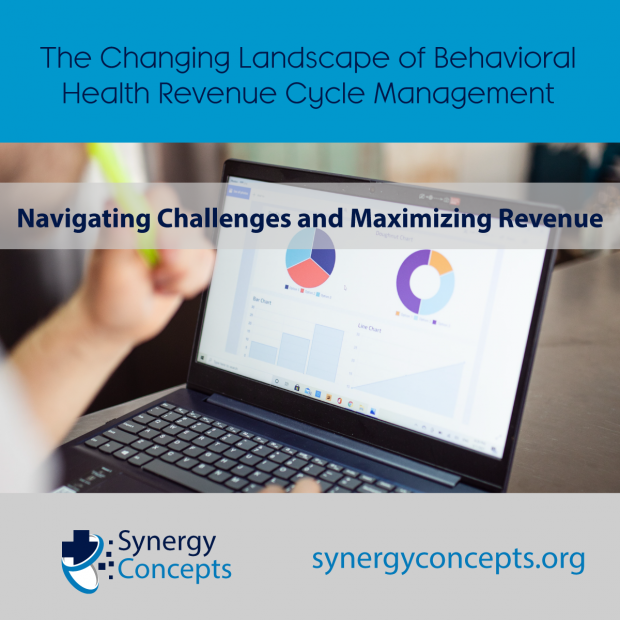In the ever-evolving landscape of behavioral health revenue cycle management, staying ahead of the curve is paramount. As the demand for mental health services continues to rise, providers are faced with both challenges and opportunities to navigate. This article delves into these changes and provides actionable strategies to maximize revenue.
With shifting regulations, complex billing processes, and increasing patient expectations, behavioral health organizations need to adapt their revenue cycle management approaches. This includes optimizing revenue capture, streamlining billing and collections, and leveraging technology to improve operational efficiency.
Navigating these challenges requires a deep understanding of the behavioral health industry and the unique dynamics it presents. By proactively addressing revenue cycle management, providers can ensure financial stability and sustainability while delivering quality care to their patients.
This article explores key areas where providers can focus their efforts to maximize revenue. From enhancing clinical documentation and coding accuracy to employing effective denial management strategies, we provide practical insights to optimize your revenue cycle.
By embracing change and implementing proactive revenue cycle management practices, behavioral health providers can not only navigate the challenges but also position themselves for long-term success.
Challenges in the Behavioral Health Revenue Cycle Management Process
The behavioral health revenue cycle management process faces numerous challenges that providers must address to ensure financial stability and sustainability. One of the primary challenges is the complexity of billing and coding for behavioral health services. Unlike traditional medical services, behavioral health diagnoses and treatment plans can be subjective and require careful documentation to ensure accurate billing.
Additionally, behavioral health providers often face a higher rate of claim denials compared to other healthcare sectors. This can be attributed to the unique nature of mental health services, which may not always fit neatly into established coding and billing guidelines. Denials result in delayed reimbursement and increased administrative costs for providers.
Another challenge is the increasing scrutiny of regulatory compliance in the behavioral health industry. As mental health services become more prevalent, regulatory bodies are implementing stricter guidelines to ensure quality care and prevent fraud. Providers must stay current with these regulations to avoid penalties and maintain a positive reputation.
The Impact of Changing Regulations on Behavioral Health RCM
Changing regulations have a significant impact on behavioral health revenue cycle management. Providers must navigate through a complex web of guidelines and requirements to ensure compliance and maximize revenue. One such regulation is the Mental Health Parity and Addiction Equity Act (MHPAEA), which requires health insurance plans to provide equal coverage for mental health and substance use disorder services.
Compliance with MHPAEA involves thorough documentation and verification of medical necessity for behavioral health services. Failure to adhere to these requirements can result in claim denials and potential legal consequences. Providers must understand the intricacies of this regulation and implement appropriate measures to ensure compliance.
Additionally, the transition from fee-for-service to value-based care models is another regulatory change impacting behavioral health revenue cycle management. Value-based reimbursement focuses on the quality of care provided rather than the quantity of services rendered. Providers need to adapt their revenue cycle management strategies to align with these new models and demonstrate the value they bring to patients’ lives.
Strategies for maximizing revenue
To maximize revenue in behavioral health revenue cycle management, providers can employ several strategies. One key strategy is to enhance clinical documentation and coding accuracy. Accurate and detailed documentation enables providers to capture all billable services, increasing revenue potential. It is essential to train clinicians and staff on proper documentation practices and ensure ongoing education to stay abreast of coding updates.
Another strategy is to implement effective denial management strategies. Providers should closely analyze claim denials to identify patterns and address underlying issues. By understanding the reasons for denials, providers can develop proactive measures to prevent future denials, such as improving documentation, reducing errors, and ensuring timely submission of claims.
Leveraging technology is also crucial for optimizing behavioral health revenue cycle management. Electronic health record (EHR) systems, revenue cycle management software, and billing automation tools can streamline processes, improve accuracy, and reduce administrative burdens. Providers should invest in robust technology solutions that integrate seamlessly with their existing systems and support efficient revenue cycle workflows.
The role of technology in improving Behavioral Health RCM
Adhering to best practices for behavioral health billing and coding is crucial for maximizing revenue and ensuring compliance. Providers should prioritize the following practices:
- Conduct regular coding audits to identify coding errors and discrepancies. This helps in identifying areas of improvement and ensuring accurate billing.
- Train coding and billing staff to stay updated with the latest coding guidelines and regulatory changes. Continuous education and training are essential to maintain coding accuracy.
- Implement coding and documentation templates that capture all necessary information for accurate billing. These templates can help ensure consistency and completeness in documentation.
- Establish clear communication channels between clinicians and billers to address any coding or documentation issues promptly. Collaboration is key to accurate billing.
- Leverage technology solutions, such as computer-assisted coding (CAC) tools, to improve coding accuracy and efficiency. CAC tools analyze clinical documentation and suggest appropriate codes, reducing manual errors.
Outsourcing Options for Behavioral Health Revenue Cycle Management
Outsourcing behavioral health revenue cycle management can be a viable option for providers seeking to optimize their revenue cycle processes. By partnering with a reputable revenue cycle management company, providers can benefit from specialized expertise and industry knowledge.
Outsourcing revenue cycle management tasks, such as claims submission, payment posting, and denial management, allows providers to focus on delivering quality care while ensuring efficient revenue capture. Additionally, outsourcing can help reduce administrative costs and improve cash flow by accelerating reimbursement cycles.
When considering outsourcing, providers should carefully evaluate potential partners, ensuring they have experience in the behavioral health industry and a proven track record of success. It is crucial to establish clear expectations, communication protocols, and performance metrics to ensure a successful partnership.
Training and Education for Behavioral Health RCM Professionals
Investing in training and education for behavioral health revenue cycle management professionals is essential to stay updated with industry changes and optimize revenue cycle processes. Continuous education ensures that staff members are knowledgeable about the latest coding guidelines, regulatory requirements, and best practices.
Providers can offer in-house training programs or provide opportunities for staff to attend industry conferences, seminars, and webinars. Online training courses and certification programs specific to behavioral health revenue cycle management are also available, allowing professionals to expand their skills and stay competitive in the industry.
By investing in ongoing education and training, providers can foster a culture of continuous improvement and equip their revenue cycle management professionals with the necessary tools to navigate the changing landscape of behavioral health revenue cycle management.
Key Performance Indicators for Measuring Success in Behavioral Health Revenue Cycle Management
Measuring success in behavioral health revenue cycle management requires tracking key performance indicators (KPIs) that reflect the efficiency and effectiveness of revenue cycle processes. Some essential KPIs to monitor include:
- Days in accounts receivable (AR): This metric measures the average number of days it takes to collect payments after a service is provided. A lower AR indicates faster reimbursement and improved cash flow.
- Clean claims rate: This metric measures the percentage of claims submitted without errors or omissions. A higher clean claims rate indicates accurate billing and reduces the risk of denials.
- Net collection rate: This metric measures the percentage of billed charges that are collected after adjustments and write-offs. A higher net collection rate indicates effective revenue capture and management.
- Denial rate: This metric measures the percentage of claims denied by payers. Monitoring denial rates helps identify areas for improvement and implement proactive denial management strategies.
- Revenue cycle cost: This metric measures the total cost associated with managing the revenue cycle process. Reducing revenue cycle costs improves overall financial performance.
By regularly monitoring these KPIs and benchmarking against industry standards, providers can identify areas for improvement and implement targeted strategies to optimize their revenue cycle management processes.
Navigating the Changing Landscape of Behavioral Health RCM
In the rapidly changing landscape of behavioral health revenue cycle management, providers must adapt to maximize revenue and ensure financial stability. By addressing the challenges posed by complex billing processes, changing regulations, and increasing patient expectations, providers can position themselves for long-term success.
Optimizing revenue capture, streamlining billing and collections, leveraging technology, and adhering to best practices in billing and coding are crucial steps in navigating the evolving landscape of behavioral health RCM. Outsourcing revenue cycle management tasks and investing in training and education for professionals further enhance revenue cycle efficiency and effectiveness.
Providers must also track key performance indicators to measure success and identify areas for improvement. By continuously monitoring these metrics, providers can make data-driven decisions and implement targeted strategies to optimize their revenue cycle management processes.
As the demand for mental health services continues to rise, providers who embrace change and implement proactive revenue cycle management practices will not only navigate the challenges but also position themselves for long-term success in the behavioral health industry.
Check out our services and solutions. We’d love to partner with you!













Leave a Reply